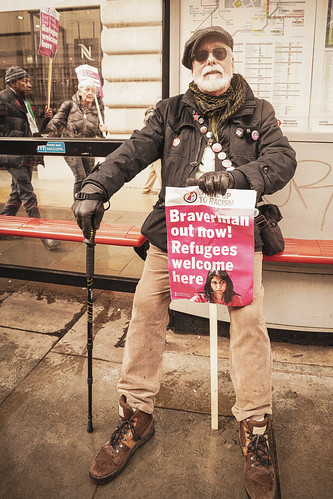Grubby, cruel and cheap: Suella Braverman stoops low with her bogus refugee figures
Braverman #Braverman

In March last year, I stood on the station platform in the western Ukrainian city of Lviv in the immediate aftermath of Russia’s invasion of that country, witnessing a huge refugee movement. Millions were on the move. It was a profoundly shocking and moving moment and one that, sadly, I have witnessed too many times in my career.
As families struggled to board the few trains leaving for Poland, men – forbidden from leaving – kissed children and hugged wives, uncertain of what the future might bring.
I’ve travelled that train line a lot in the intervening period of the war. Now, however, the story is a different one. The flows have reversed, with many Ukrainians returning to areas they have decided are safer.
The dynamics of refugee movement are complex. Most of the time, most people do not want to leave their homes. Some choose to stay despite real threats to their safety. Others leave and immediately regret it. Some seek to make new lives, feeling they have reached a point of no return.
The refugee experience is dynamic. It is not static. That people might become refugees does not mean they will. That they are currently refugees does not mean they will remain so.
All of which is important to understand amid the dishonest claims being pushed by home secretary, Suella Braverman, and her allies over the definition of what a refugee should be, suggesting 780 million people could fall under the vague rubric they see of being eligible to seek asylum, under threats including those related to gender and sexuality.
The reality is that the dubious figure of 780 million, proposed last year by the former Downing Street chief of staff Nick Timothy and co-author Karl Williams in a paper for the rightwing Centre of Policy Studies, is essentially meaningless, and designed to be alarmist.
Who hosts these refugees? Not Britain. A third are hosted by just five countries: Turkey, Germany, Iran, Colombia and Pakistan
Because 780 million people could, theoretically, become refugees, it does not mean they will, or even that their status would be permanent. As a useful point of comparison, the global number of forcibly displaced people – according to the UN high commissioner for refugees – is at present 110 million.
Of those, however, the vast majority – 62.5 million – are internally displaced. Refugees in other countries account for 35.3 million. Just over 5 million people globally are asylum seekers.
And who hosts these refugees, covered by the UNHCR mandate? It is certainly not Britain. More than a third are hosted by just five countries – Turkey, Germany, Iran, Colombia and Pakistan. Three-quarters are hosted in low- and middle- income countries, and 70% by neighbouring countries.
That 780 million, seen in this light, is nothing more than a bogus figure being pushed in pursuit of a grubby and cruel argument. Braverman and her supporters’ mooted reform of the 1951 refugee convention is based on straw-man arguments, cooked up to justify her own hard-right populist position on migration.
What exactly does Braverman want to unpick? The 1951 convention was a milestone in humanitarian law. Drawn up close to the end of the second world war, which saw vast refugee displacements, it provided a single, legal and universal definition of what it meant to be a refugee, as well as significant rights, including non-discrimination.
It also included the key principle of non-refoulement: the guarantee that no one should be returned to a country where they would face torture, cruel, inhuman or degrading treatment or punishment and other irreparable harm.
For Braverman, however, the refugee convention is not to be celebrated for the humanitarian protections that it offers but to be criticised for driving “illegal migration”. For while the figure of 780 million has been deployed as deliberately eye-catching, it is a subtext to Braverman’s more pernicious central argument: her refusal to recognise that some of those crossing the Channel might qualify as refugees under the convention’s definition.
Braverman would do this by weakening the central thrust of the convention that defines the refugee condition as having a “well-founded fear of being persecuted for reasons of race, religion, nationality, membership of a particular social group or political opinion” to suggest that some seeking refugee status were simply facing “discrimination” and not worthy of asylum.
While it seems unlikely that Braverman will find much of a serious international audience for her ideas, her speech marks the latest concerning coarsening of the terms of the debate in the UK around migration and refugees by attacking a key pillar of humanitarianism in pursuit of headlines.
That Braverman should be making this argument even as thousands of Armenians are fleeing Nagorno-Karabakh speaks volumes.